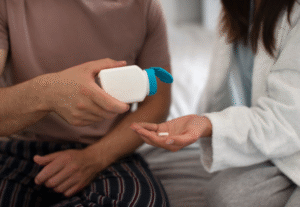
For too long, women have been expected to put their health last—after their families, careers, and responsibilities. Society has normalised women sacrificing their well-being as if their physical, emotional, and reproductive health were secondary. But here’s the truth: when women’s healthcare is neglected, the ripple effect is felt across families, communities, and entire nations.
Women’s health is more than just medical check-ups—it’s about taking charge of your body, mind, and well-being importance, many still assume that a “little stress” or “pushing through” is just part of being a woman. The reality? Ignoring these issues leads to anxiety, depression, and chronic stress, not just for women but for those who depend on them.
Women’s bodies have unique needs—so why is healthcare often one-size-fits-all? From hormonal shifts to conditions that primarily affect women, understanding these differences is crucial. A strong, healthy woman is the foundation of a thriving community. This post isn’t here to tell you not to put yourself last—it’s here to remind you why you never should.
Key Differences in Women’s Health and Men’s Health
The most important aspect of women’s healthcare is recognising and addressing the key differences between male and female bodies. Women have specific health occurrences, such as menstruation, pregnancy, and menopause, that require special care and attention. Understanding these differences can help women receive a tailored healthcare plan from their providers.
For instance, menstruation is a natural process that every woman experiences. However, it can sometimes be uncomfortable and extremely painful. With the right education and access to menstrual hygiene products, women can effectively manage their periods with dignity, without disrupting their daily activities.
Another major difference in women’s health is pregnancy. This period brings several emotional and physical changes, creating a need for comprehensive prenatal care. By receiving timely prenatal screenings, nutritional support, and childbirth education, women can improve their chances of a healthy pregnancy and delivery.
Physical Health: Empowering and Prioritising Women’s Healthcare

Maintaining physical health is the most essential for a woman’s overall well-being. Adopting healthy habits and making informed lifestyle choices about nutrition, exercise, and regular check-ups play a key role in staying physically fit.
Healthy Diet for a Physically Fit Woman
Taking a well-balanced approach is crucial for maintaining your physical health. When it comes to nutrition, focus on a variety of nutrient-rich foods that not only support your body’s proper functioning but also help prevent nutritional deficiencies, keeping you physically and mentally active.
For example, during pregnancy, women require extra nutritional care to support their baby’s development and growth. Studies suggest that pregnant women need an additional 300 calories per day, best sourced from vegetables, fruits, and whole grains.
Top 10 Food Choices for a Healthy Woman
- Whole grain oats
- Berries (“brain berries”)
- Dried plums and prunes
- Dark green leafy vegetables
- Walnuts and other nuts
- Greek yoghurt
- Soybeans
- Avocado
While these nutrient-rich foods benefit every woman seeking a balanced diet, consulting a registered dietitian or women’s healthcare professional is advisable if you:
- Are pregnant
- Have a chronic disease
- Are over the age of 45
- Are seeking weight management
Physically Active Women Can Move Mountains
If good nutrition strengthens your immune system, regular physical activity helps maintain overall health by reducing the risk of chronic diseases like heart disease, diabetes, and certain cancers. Even five minutes of exercise or simple daily activities can significantly boost your health.
Key Benefits of Physical Activity
- Better weight management
- Lower blood cholesterol levels
- Reduced risk of type 2 diabetes and certain cancers
- Lower blood pressure
- Stronger bones, muscles, and joints, reducing the risk of osteoporosis
- Lower risk of falls
But where do you start? Here are the Consensus-Physical-Activity-Guidelines-for-Asian-Indians.PDF
When to Consult a Doctor About Physical Activity
Seek medical advice before starting or modifying your exercise routine if:
- You are over 45 years old
- You are pregnant
- Physical activity causes chest pain
- Moderate activity leaves you extremely breathless
- You have a heart condition
Also Read: Health and wellness importance in 2025: Am I healthy?
Mental and Emotional Well-being: Achieving Mindfulness for a Peaceful Life
Mental well-being concerns in women’s healthcare include depression, anxiety, eating disorders, and trauma-related disorders. Women are more likely than men to experience certain mental health conditions. Thankfully, professional support tailored to women’s unique needs is available—you just need to take that step, visit a therapist, and share the thoughts that trouble you day and night.
Shocking Mental Health Statistics Among Women in India
A study by Agenda Alliance reveals:
- 22% of young women experience a common mental disorder, such as anxiety or depression.
- More than three-quarters (78%) of women who have faced extensive physical and sexual violence—both in childhood and adulthood—have experienced life-threatening trauma. 16% suffer from Post-Traumatic Stress Disorder (PTSD).
- One in five women (19%) experience mental health disorders, compared to one in eight men (12%).
Addressing Mental Wellness Challenges in Women’s Healthcare
1. Premenstrual Mood Changes
Many women experience mood swings and irritation before their menstrual cycle. Managing your lifestyle can help ease these fluctuations:
- Eat a balanced diet
- Exercise regularly
- Avoid junk food
- Get enough sleep
- Reduce stress through meditation
2. Psychiatric Disorders During Pregnancy
Pregnancy can be an emotional rollercoaster, making mental health support essential. Here’s how you can manage your well-being:
- Share your feelings with friends, family, or a doctor—it can bring a sense of relief.
- Practise meditation to help calm your mind.
- Stay physically active if possible, keeping your doctor’s advice in mind.
3. Mental Health During the Postpartum Period
Many new mothers struggle with postpartum depression or anxiety. If you’re feeling overwhelmed, try to:
- Get as much rest as possible.
- Connect with other new mums (but follow medical advice that’s right for you).
- Make time for yourself, even if it’s just a few minutes a day.
- Avoid alcohol and other substances that can negatively impact mental health.
Emotional wellness is about feeling positive and passionate about yourself and life. Expressing and managing your emotions in healthy ways—such as confiding in friends, exercising, journaling, or talking to a therapist—helps you handle daily challenges with resilience.
Tips to Strengthen Your Emotional Health
If stress feels overwhelming, try incorporating these simple habits:
- Set aside time for activities you love—they can bring you inner peace.
- Step outside and soak up some sunlight; it’s a natural mood booster.
- Prioritise quality sleep.
Related: 5 effective ways to deal with trauma
Know why women seem to experience mental health issues than men? Look at what real women are saying:
Why Do Women Seem to Experience More Mental Health Challenges Than Men?
byu/Bitnun inkolkata
Sexual and Reproductive Healthcare in Women

Let’s face it! Giving birth is no less than a mountain to climb. Taking care of your reproductive system should not be a burden to you. Reproductive health is often ignored by women while maintaining their overall health until the situation worsens. Pregnancies without complications are the mere wishes of every woman while planning for a kid. Sadly, women do not pay much attention to their reproductive health.
1. Menstrual health guidance:
Menstruation is a natural and important process in every woman’s life. A woman to maintain her menstrual health must consider hygiene practices, manage menstrual symptoms, and seek medical attention for irregularities or concerns.
During the menstruation process, the uterine lining sheds, which results in the release of blood and tissue through the vagina. It is a natural part of women’s reproductive cycle. Common symptoms of menstruation include abdominal cramps and discomfort, irritation, bloating, and mood swings.
During this period, women need to be aware of these symptoms and adopt strategies to manage them effectively, such as maintaining a healthy diet, exercising regularly, and practising relaxation techniques.
But if your pain becomes unbearable at certain times, it is better to consult a doctor and manage your menstrual cycle as per the advice only.
For you: Recognising the Early Signs of PCOS Symptoms in Teenagers.
2. Pregnancy and Postpartum in Women’s Healthcare: Help Yourself to Heal
Pregnancy is a beautiful journey that requires special care and attention. Adequate and timely prenatal care and postpartum care can help build the long-term health and well-being of new mothers and their infants.
During pregnancy, women experience several hormonal changes, sudden weight gain, and an increase in blood volume. So, it is important for expectant mothers to go for regular prenatal check-ups.
Here are some ways that can help new moms in speedy recovery from vaginal delivery:
- Thick period pads that absorb well, and
- A natural perineal spray that will keep you cool down there
- Bowel movements postpartum can be painful; it is better to keep stool softeners with you
- Take a postpartum sitz bath
- Most importantly, follow the diet that your gynaecologist has recommended for you.
3. Menopause and beyond
Menopause is a sign that shows the end of the reproductive cycles of women. It occurs when a woman’s ovaries stop producing eggs. Common symptoms of menopause include hot flashes, vaginal dryness, and mood changes. Treatments and effective management practices are available in the medical industry to help women manage these symptoms without losing their mental peace. Here are a few steps that you can take to stay healthy during your menopause.
- Self-care: try creating a personalised plan to manage hot flashes and other symptoms
- Consult your healthcare professional; this can help you manage your menopause better
- Be physically active
- Eat healthy foods
- Avoid alcohol or any other drugs: if you are addicted, get help from your healthcare professional
Tips for Lifestyle Choices and Hygiene Maintenance for Women’s Healthcare
A healthy lifestyle boosts physical health, increases energy levels, and enhances mental health, leading to improved overall quality of life. Here are some healthy lifestyle choices that every woman can adapt to, even if you are busy.
- Fill out healthy options in your kitchen
- Spend less time on social media; it may spoil your healthy routine
- Stay hydrated; start and end your day with water
- Prioritise yourself; take a break to stretch and breathe
- Try to get fresh air in the morning
Feminine hygiene maintenance tips. Don’t hesitate to talk to your daughter about it
It is important to understand feminine hygiene tips on feminine care for every woman. If you are growing up, just starting to learn about your body, or even looking to teach your daughter about feminine care. Here are some hygiene tips for your feminine care that you must know before it’s too late.
- Wipe properly: If you don’t wipe properly after you use the toilet, it may leave germs at your sensitive intimate places, which can lead to discomforting infections. Teach your toddlers to wipe from front and back properly so that they stay safe from getting infections.
- Follow up with moist tissue: Once you have dry wiped after using the toilet, be sure to wipe again with flushable moist toilet tissue.
- Include diets that help you prevent UTI infections: You are what you eat (or drink). If you eat high-sugar foods, it can increase your chances of getting yeast infections. So, control your cravings and be moderate in what you eat. With a balanced nutrition diet, drink plenty of water, especially if you want to stay safe from UTI infections.
- Be a period-proud woman: Periods are completely natural! So, there is no need to feel embarrassed about it. Following medically approved period tips with good vaginal hygiene can help you feel confident.
Wrapping up: Prioritise Your Well-being
Realising the importance of women’s health care is not just about addressing their physical well-being. By recognising women’s healthcare, making it accessible, removing barriers to healthcare, and prioritising their well-being, we can build a healthier future for all.
Health spending differences are mainly due to women living longer, having more health issues, and the costs associated with pregnancy and menopause. However, several women from the marginalised community remain discouraged, which is quite heartbreaking. So, it’s high time that you should prioritise your health because several lives are connected to your well-being. Your family/friends need you! So, make yourself a priority. Your health is your power. How do you prioritise self-care? Let’s start a conversation in the comments!
FAQs
Q-1: What are five female health concerns?
Some common health issues for women are heart disease, diabetes, mental health issues, osteoporosis, and Urinary Tract Infections (UTI)
Q-2: What is the concept of women’s health?
Women’s health is a wider term that is related to the overall well-being of a woman and includes thorough care of her physical, mental, and reproductive health.
Q-3: What are the women’s health issues in Bangladesh?
Bangladeshi women face several health issues, including malnutrition, reproductive health issues, and violence.
Q-4: What are the three biggest health problems?
The three biggest health problems include cardiovascular disease, mental health issues, and diabetes.
Q-5: What are the women’s main problems?
Though women face many problems, gender inequality, violence, and mental health issues are the main problems that every woman faces.






